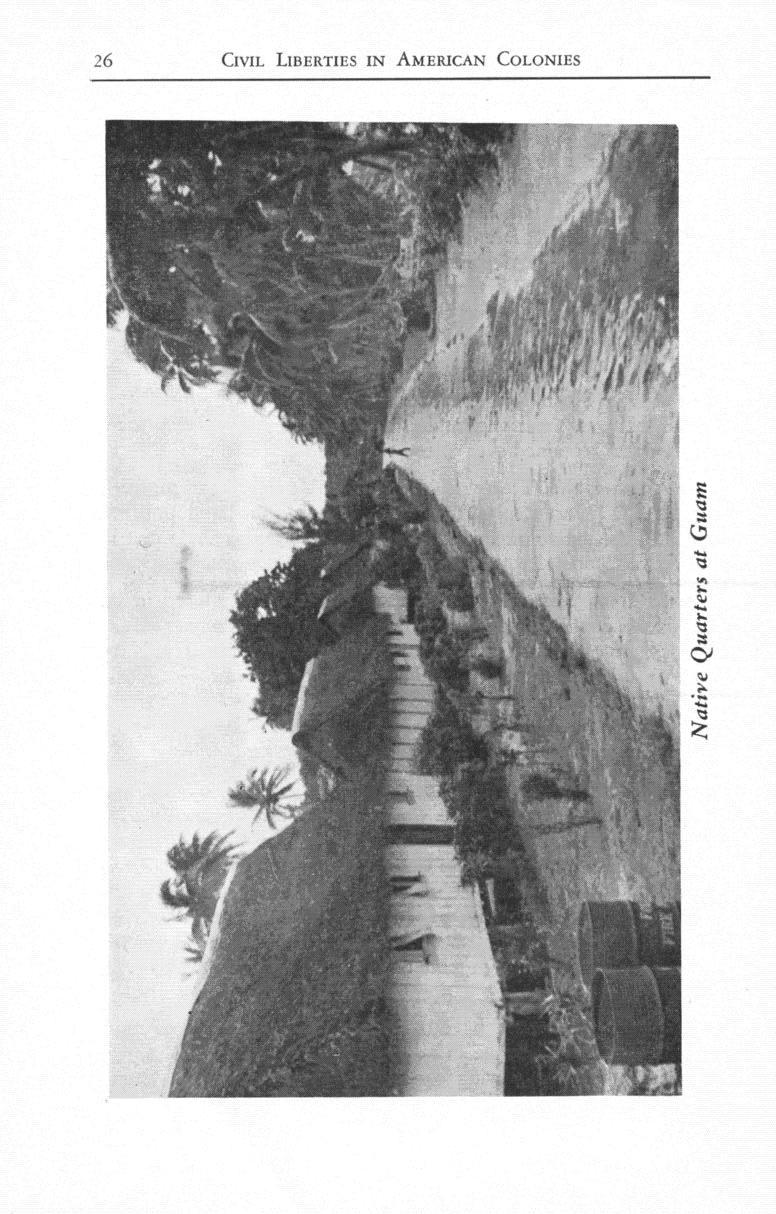
5 minute read
GUAM
Guam
WITH an area of only 225 square miles, the tiny island of Guam nevertheless enjoys an importance out of all proportion to its size. It is a vital link in the chain of communications between the United States and the Far.East. It is a relay station for trans-Pacific cable service and a stopover for the transpacific corn-- mercial air service. It also maintains a commercial radio station. Its military importance has been the chief determining factor in the policy toward Guam and its 22,000 Malay inhabitants.


Seized by the American cruiser Charleston on June 21, 1898, in. the war with Spain, it was ceded to the United States by the Treaty of Paris. It was put at once under control of the Navy Department where it has remained ever since.


In signing the Treaty of Paris, the United States agreed: (Article IX, Paragraph 2) “that the civil rights and political status of the native inhabitants of the Territories hereby ceded to. the United States shall be determined by the Congress.”



After forty years, this promise still remains unfulfilled in respect to Guam. No legislation has been passed fixing its status, providing for citizenship or for its form of government. The Navy rules as its sole authority. The anomalous position of the residents of Guam is succinctly expressed in a Judge Advocate General’s, decision approved by the Secretary of the Navy in 1923.





“Held. While a native of Guam owes perpetual allegiance to, the United States he is not a citizen thereof, nor is he an alien, and there are no provisions under which he may become a citizen of the United States by naturalization.” During the hearings before a sub-committee of the Senate Committee on Territories and Insular Affairs in 1937 it was held by a representative of the Department of Labor that a native of Guam could become a citizen, but this has never been established by the courts. Children of American citizens born in Guam have been refused the right to vote in the United States.
The people of Guam have readily accepted American customs. and the English language in addition to their native Chamorro, have improved their living conditions and their school system, largely through their own initiative, and have reached a high level

of literacy. Teaching in English in the schools merits the same criticism on educational grounds as in other colonies. The languase situation is also complicated by the survival of Spanish among sections of the population.


For many years the inhabitants of Guam have insisted on their right to become American citizens and to have a larger share in the administration of their own affairs. A number of the island’s~ naval governors have asked that the people be granted citizenship, or at least that their civil status be established by act of Congress. Secretary of the Navy Paul Morton made that request as early as 1904. Bills to grant citizenship to the people of Guam were before Congress in 1927, 1934, and 1936. In 1937 the school children and adults of Guam financed the journey of two delegates to Washington to ask Congress for citizenship. One was the chairman of the House of Council (lower house) of the Guam Congress and the other the vice-chairman of the House of Assembly (upper house). The bill was opposed by the Navy Department, and was defeated. Even in the island, the Navy officials sought by intimidation and boycott to thwart the leaders of the citizenship movement.





B. J. Bordallo, chairman of the Guam House of Council, thus described the island government in his testimony before the Senate Committee: <t . . . We have taxation without representation. A naval officer, as governor of Guam, has the power to make or break laws, and appropriate the moneys of the people in any way or manner he desires without accountability to the people who are the taxpayers. The Governor appoints all the high government officials including the Court Judges and Island Treasurer, Island Attorney and District Commissioners to serve during his pleasure. If any native official desires to hold his job he must not incur the displeasure of His Excellency, or he will find himself without a position, as some judges, island attorneys, and land judges, etc., have found out to their sorrow !”






The American naval officer is military commander of the island, commandant of the naval station, and combines the functions of executive, legislative and judicial power of the government, outranking even an admiral.







